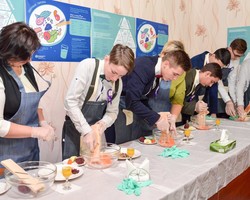Young people from Transnistria say “Yes!” to healthy eating and more physical activity

WHO/A. Marchenko
To mobilize all schools and communities to undertake concrete actions that support the adoption of a healthy diet and active lifestyle, WHO in collaboration with local health specialists introduced school lessons to educate young people in these areas. The lively, interactive 1-hour sessions are being conducted in all schools on the left bank of the Nistru River.
On 5 December 2018, students from School No. 1 of Parcani were the first to receive the special lesson. The programme was extended to all Transnistrian schools as of 14 December 2018. The students, aged between 14 and 15 years, learn about:
- the intensity of different forms of physical activity;
- the reduction of fat, salt and sugar consumption; and
- the negative influence of smoking and alcohol on health.
Thanks to the engaging question-and-answer format, young people participating in the first lesson were able to actively reflect on healthy and unhealthy habits and behaviours. They also presented their thoughts through posters on healthy eating, physical activity, and the health impacts of smoking and the harmful use of alcohol.
Additionally, the students participated in a culinary master class where special guest Andrei Pisin, a well-known chef from a local restaurant, demonstrated the preparation of an affordable salad made with vegetables.
“I’m happy to learn more about nutrition and healthy eating,” 15-year-old Maria Grebinnaia said enthusiastically. “Also, I like to dance and I have classes 2 times per week. I will share my new cooking experience with my parents. I didn’t know that a salad can be prepared from affordable ingredients and be so tasty!”
“I’m helping my parents in gardening, and I’ve learned that this is moderate-intensity physical activity. I also like to bike,” mentioned Evgheni Mihov, a 14-year-old boy.
To support the school lessons, WHO and local specialists developed a colourful, original information package using friendly and accessible language. It includes brochures for pupils in grades 1–4 and 5–11, and a set of colourful bookmarks depicting a healthy plate of food as well as the importance of drinking water and engaging in physical activity. The package also includes an extended guide for teachers on how to conduct the lesson.
“Every fifth person in the world is an adolescent. The role of WHO and health-care and education institutions is to support the development of healthy habits in adolescents and to protect them from risks for a longer, healthier and more productive life,” stressed Stela Gheorghita, Coordinator of the WHO Health Emergencies Programme at the WHO Country Office in the Republic of Moldova.
This first step in the joint activities of WHO and local health and education specialists aims to promote the understanding of healthy habits, to engage young people to adopt a healthy lifestyle, and to address the main risk factors of noncommunicable diseases.
This activity is part of the biennial collaborative agreement between the Ministry of Health, Labour and Social Protection of the Republic of Moldova and WHO/Europe. The initiative is funded by the European Union’s Support to Confidence Building Measures Programme, and coordinated by WHO under technical assistance and capacity-building activities in the health sector.



